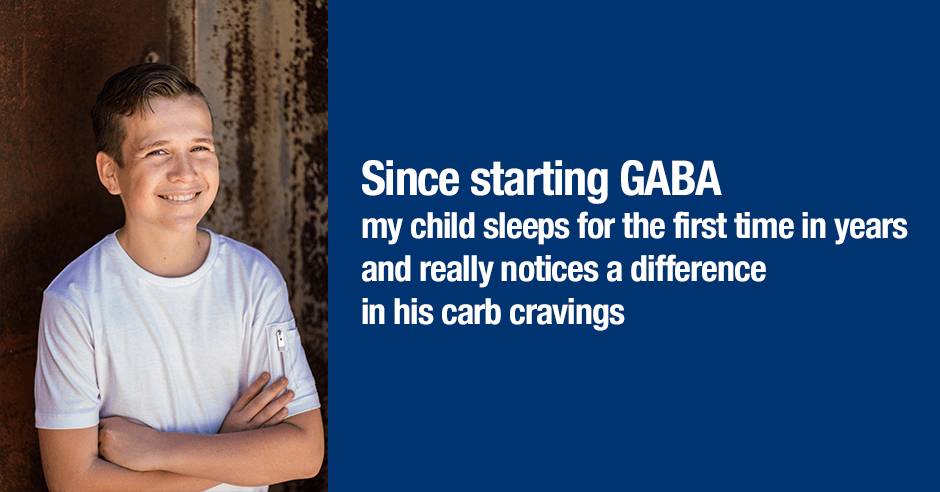
Today I’m sharing a success story where GABA, used as a supplement, helps a teenage boy sleep for the first time in years and also helps reduce his carbohydrate cravings. This boy’s mom, Calle, shared their wonderful story on this blog post – GABA for ending sugar cravings (and anxiety and insomnia):
Got some GABA for our ASD [autism spectrum disorder] child. He has not slept well for years. We had tried all kinds of stuff. I am a healthcare pro and have studied and read and tried so much. But this stuff is a true miracle. For the first time in years my child sleeps. He sang and was all smiles from ear to ear for the first three days.
And then she posted this a few days later (and how shocked they both were!):
Our son has also really noticed a difference in his carb cravings since doing GABA. He went to grandma’s house and was not tempted by 6 pies, tons of cookies, sweet rolls etc. We were both shocked. This is a kid who would mow through tons of cookies, rolls and pastries.
I love getting feedback like this and am so happy for them!
There is no study on the use of GABA as a supplement for helping sleep problems in those individuals with ASD/autism spectrum disorder. Here are two papers for further reading until such a study is done:
Studies indicate that between 50% and 83% of individuals with ASD have sleep problems or disorders.
This review approaches sleep in autism from several perspectives: Sleep-wake mechanisms and problems, and brain areas and molecules controlling sleep (e.g., GABA and melatonin) and wake maintenance (e.g., serotonin, acetylcholine and glutamate).
GABA concentration in the sensorimotor cortex of adults with ASD was lower than in neurotypical adults (decrease by 17%). Interestingly, GABA concentrations were positively correlated with self-reported tactile hypersensitivity in adults with ASD.
If you’re new to the amino acids here is a quick summary about GABA: low levels of GABA, a calming neurotransmitter typically leads to anxiety, fears and panic attacks, with the anxiety showing up as a physical kind of anxiety with muscle tension or muscle spasms. Low GABA levels can also affect sleep especially when there is muscle tension. Folks often describe that they lie awake feeling stiff and tense. And as with all neurotransmitter deficiencies there is also the carb/sugar and/or alcohol (in adults) cravings as a way to self-medicate.
In this instance low GABA only resulted in sleep issues and carb cravings for Calle’s son. No mention was made about anxiety but it’s possible he was not able to articulate that he felt anxious. I don’t know if Calle’s son experienced tactile hypersensitivity (common in ASD) but if he did this may have factored in with his sleep issues.
In her comments Calle also shared this and it’s so true: “Healing is like learning to dance, you stumble, step on toes and learn to trust your body.”
I appreciate Calle for sharing her son’s story and I’m sharing it here so you can see yet another way GABA can address symptoms and improve someone’s life (and improve things for the rest of the family too). If her son can now sleep after years of sleep challenges then anything is possible.
Keep in mind that this blog goes beyond a teenage boy with an ASD diagnosis who has sleep issues and craves carbs. It could be applicable to anyone – male or female, adult or child – who has low GABA levels that contribute to his/her sleep issues and carb cravings (and often physical anxiety symptoms too).
How have you used GABA as part of your own healing journey or for your child or other family member and have you found the journey to be like a dance?
If you’re a practitioner, do share how you have helped your clients/patients by using GABA.
Feel free to post your questions here too.